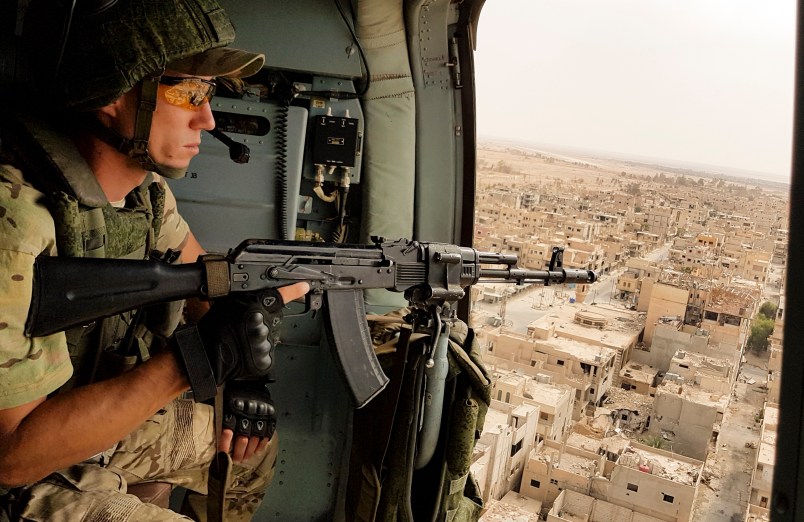MOSCOW (AP) — A stern Russian warning Thursday against targeting its special forces in eastern Syria heightened concerns over direct clashes between rival Moscow- and Washington-backed forces fighting for the energy wealth to be found among the Islamic State group’s shrinking domain.
The warning was followed by an acknowledgement from the Pentagon of an unprecedented, face-to-face meeting between Russian and American military leaders inside or near Syria to address the rising tensions.
With both Russian-supported Syrian government forces and rival, U.S.-supported Syrian Democratic Forces determined to follow the bends of the Euphrates River all the way to the Iraqi border, Russia’s warning underscored the delicacy of the arrangements that have so far kept the two sides from entering into open conflict.
Both sides and their patrons say they are determined to wipe out the Islamic State group from Raqqa province in the north and Deir El-Zour province in the east as quickly as possible. The Syrian government depends on Iranian military support, as well.
But the region — especially Deir el-Zour province — is home to mineral, natural gas and oil reserves that the Syrian government will need to restore its economy as it looks to wind down a more than six-year-long civil war.
As for the SDF forces fighting there, most are from the province and many do not want Syrian President Bashar Assad’s authority restored, having risen up against his government in the early years of the war.
And Washington fears that further advances by pro-government forces could help Iran — which also has thousands of militiamen fighting alongside the Syrian government — expand its influence across the region via a land bridge spanning through Iraq, Syria and Lebanon, all the way to Israel.
Russia’s Defense Ministry said for the first time Thursday that it had deployed special forces with pro-government forces in the province and accused the U.S.-backed SDF of firing on its allies twice in two days.
It said it would retaliate against any future strikes from SDF-controlled areas.
“The firing positions in those areas will be immediately destroyed with all the arsenal at our disposal,” said Ministry spokesman Maj. Gen. Igor Konashenkov in a statement.
Such a response would likely endanger the U.S. special forces embedded with the SDF, raising the possibility of escalation. The U.S. provides artillery and air support for the SDF.
An SDF officer commanding the Deir el-Zour forces denied targeting pro-government forces and promised reciprocal action for any attacks against his troops.
“We are far from them, Daesh is between us,” said Ahmad Abu Khawla, using the Arabic acronym for IS. “We didn’t fire a single bullet toward the regime” forces.
Earlier in the week, the U.S. accused Russia of deliberately targeting an SDF position in Deir el-Zour. It said no U.S. forces were wounded. The SDF said six of its own were.
The Pentagon did not specify when the meeting between Russian and American senior officers was held other than to say it was in recent days.
Army Col. Ryan Dillon said the officers shared maps, graphics and information about where their forces are battling in the area. He said their ground forces in Syria have been coordinating over telephone lines in the past month to avoid firing on each other.
The Deir el-Zour and Raqqa provinces are bisected by the Euphrates River. The Islamic State group, at the apex of its power in 2015, once controlled both banks of the river in Syria and deep into Iraq.
In recent months, the SDF has driven the militants back along its north and east banks, while pro-government forces have been advancing along the south and west.
The two sides have largely avoided conflict throughout the war as President Assad focused his efforts on defeating a revolt against his family’s 40-year dynastic rule.
This balance has largely held until the two sides reached Deir el-Zour.
The Kurds leading SDF say they want their own autonomous zone in a federated Syrian republic, while many Arab fighters in the group say they will not submit again to Assad rule.
Many oil fields, including al-Omar, Syria’s largest, are scattered on the eastern bank of the Euphrates River in Deir el-Zour.
“We have prepared plans to liberate the eastern banks all the way to the Iraqi-Syrian border,” said Abu Khawla, the SDF officer.
The Russian-backed campaign has so far been to recapture the provincial capital, also called Deir el-Zour.
In the past two weeks, the pro-government forces gained control of most of the city and crossed the Euphrates River to the area of SDF operations, prompting objections from the rival forces.
Syrian troops now control roughly 85 percent of the city and expect to gain full control of it in the coming week, Konashenkov said.
Meanwhile, activists reported an intensive airstrike campaign in western Syria, in the area between Hama and Idlib province, where an al-Qaida-led offensive against government troops began Tuesday.
The opposition-operated Qasioun News Network and the Observatory reported dozens of airstrikes, including barrel bombs, in south Idlib and north Hama.
The Observatory said more than 40 civilians were killed in nearly 500 raids in about 40 towns and villages since Tuesday. The offensive was a test to the Russian-negotiated “de-escalation zone” announced for Idlib last week.






